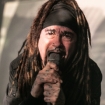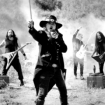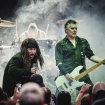Driving by Al Jourgensen's house, you'd have no idea that one of the godfathers of industrial music lived here. But behind a Leave It to Beaver façade on the outskirts of Los Angeles, the man who brought you Ministry, Revolting Cocks, Pailhead and Lard (among others) is surrounded by accouterments more indicative of his dark music and punk-rock sense of humor: a caged cross studded with working lightbulbs, a pitch-black mannequin with an equally black ram skull for a head, a colorful kitchen mural of the Dalai Lama with a Mohawk, a fish tank populated by plastic Day-Glo dinosaurs. The combination of sinister and psychedelic imagery is an apt reflection of the man who put out records with titles like The Land of Rape and Honey, Filth Pig and AmeriKKKant, who took drugs with narcotic legends Timothy Leary and William S. Burroughs, who put an image of a crucified George W. Bush on an album cover (Ministry's Rio Grande Blood) and who cheated death by misadventure on more than one occasion.
Of course, Jourgensen has a long history of political protest songs — perhaps the most prominent example being "N.W.O" from Ministry's 1992 breakthrough album, Psalm 69 — but today, at age 60, he's looking at the bigger picture. "We can keep dicking around with our political drama, but we're in a literal ecological crisis right now," the Cuban-born, Chicago-bred musician says. "We're all gonna fuckin' die — right wing and left — so it's time for someone to have the courage to address that. But I'll be dead before the real shit hits the fan."

Jourgensen and his girlfriend-manager Liz usher us into his home studio, where he's been writing material with Ministry's newest member, original Tool bassist Paul D'Amour. Uncle Al has also been working on the soundtrack for a forthcoming documentary called The Haunted Painting. In fact, he's got a print of the creepy canvas propped up next to his mixing desk. "Some guy found it in a dumpster and put it on eBay years ago," he explains. "Apparently, a few owners had bad experiences with it, but it's now somehow worth a shitload."
When we first arrive, Jourgensen is watching the long-running "reality" show Naked and Afraid on a ginormous flat-screen in his living room. Given that he's managed to survive the ever-shifting whims of the music industry for nearly 40 years — not to mention the perils of rock & roll decadence and the often-bewildering political realities of modern America — his choice of programming is more than fitting. It's also a massive coincidence, seeing as how this is the "Survival Issue" of Revolver. "Ministry is like that old parable about the tortoise and the hare," Jourgensen muses. "Nine Inch Nails and Rammstein are the hare, and we're the tortoise. We just keep plugging along."
WE'RE HERE TO TALK ABOUT SURVIVAL, WHICH DOVETAILS NICELY WITH THE SHOW YOU WERE WATCHING WHEN WE ARRIVED. WHAT DO YOU LIKE ABOUT NAKED AND AFRAID?
AL JOURGENSEN It hits home with me because when most people think about touring, they think about bands like the Rolling Stones or something, where it's private jets — you fly in, do your gig and get out. They don't understand the nuts and bolts of it. Just getting our first bus was like, "Whoa!" Before that, we were driving around in a van with 11 stinky people and equipment. You're out there slogging it, and it's like Naked and Afraid — except that you have clothes on sometimes.
HOW ROUGH DID TOURING GET FOR MINISTRY IN THE EARLY DAYS?
In 1983, we were opening Depeche Mode's first tour of America. We were getting paid, like, 50 bucks a night or something, so we'd all cram into one hotel room. I remember being in Times Square — and back in the Eighties, Times Square was pretty rancid, before [former NYC mayor Rudy] Giuliani cleaned it up and made it Disney World — and taking one of my boots off so I could hack a lock off of a dumpster behind a movie theater so we could eat the 50-pound bags of stale popcorn that they'd throw out. We lived on popcorn for three or four days so we could save money for gas. So you have clothes on, but you're living off the land like Naked and Afraid. But there are plenty of times when you're naked on tour, too. [Laughs]

I'VE HEARD STORIES OF BANDS GIVING BLOOD TO GET MONEY TO STAY ON TOUR. HAVE YOU EVER DONE THAT?
I've heard that, too, but I've never done it because I have so many pathogens in my system that nobody's gonna take my blood. I've had Hepatitis A, B, C — and I'm sure I've had D and E if they exist. They won't take my blood, but I can see bands doing that because it's getting worse out there. We're back to medieval times, where musicians traveled from feudal kingdom to feudal kingdom to please the king and get some food and a few nights of rest under a roof. But if you didn't please them, you got beheaded. It's almost like that now. You're either super rich or you're giving blood. We've been fortunate enough to maintain an audience. We're by no means Madonna, but we're upper middle class in terms of bands, I guess you could say. And that's a dying breed because of the way things are.
YOU'VE SURVIVED IN THE MUSIC INDUSTRY FOR NEARLY 40 YEARS NOW. WHAT DO YOU ATTRIBUTE THAT TO?
Eating grubs and worms, like Naked and Afraid. [Laughs] I was talking to Richie Ramone the other day, and he found his way to survive. He wasn't the original drummer of the Ramones, but he was an integral part in their resurgence. And he's found his niche in Central and South America. He goes down there and he's a fucking star. He can sell out stadiums. Here in America, he can't sell out a pizza parlor with his band. So he does the one tour, and that sustains him for the year. Killing Joke plays stadiums in Japan, but much smaller places here. Whereas nobody knows who the fuck we are in Japan, and we don't have the gig that Richie has in South America, so we stick to Europe and here. You find a way to maintain.
WHEN MINISTRY FIRST SIGNED WITH A MAJOR LABEL IN THE EARLY EIGHTIES, YOU FELT LIKE THEY TOOK ADVANTAGE OF YOUR INEXPERIENCE. WHAT DO YOU WISH SOMEONE HAD TOLD YOU BEFORE YOU GOT INVOLVED WITH THEM?
It's not what somebody would've told me — it's what I would've told myself. I got them interested with what I was doing, so they signed me. But then they just wanted to answer to corporate shareholders and the bottom line, so they didn't wanna try anything new. It was like, "You're obviously talented, so we'll sign you. But you have to do what we say."
WHAT DID THEY WANT YOU TO DO?
For starters, they made me cut my hair. If you look at those early photos, I have short hair. I felt like Samson in the Bible story — my powers were taken away. They bought me a wardrobe, they picked my management company, my producer, where I was gonna record, which songs were gonna be on the record, the background singers, the musicians — and I didn't wanna do that again. When I told them I wouldn't do another record for Arista, they sent a psychiatrist to my house under the guise of an A&R guy.
HE PRESENTED HIMSELF AS AN A&R GUY?
Yeah. I sniffed it out right away because I'd been in and out of therapy since I was 13 years old. I'd been in foster homes — I know a fucking shrink! [Laughs] So I got him to admit it. After that, he actually sent me a photocopy of Thompson Twins' first royalty check, because they were on Arista, too, and they'd had a big hit. He said, "If you play by our rules, these are the kind of checks you could be getting."

AND THAT'S WHY YOU DON'T LIKE THE FIRST MINISTRY ALBUM, WITH SYMPATHY, RIGHT? NOT BECAUSE OF THE MUSIC, BUT BECAUSE OF THE EXPERIENCE YOU HAD.
The record is fine. We did the best we could do. If I'm trying to play basketball with one arm tied behind my back and I still score 18 points, that's pretty good. But I could've scored 30 or 40 if I had my other arm.
YOU'RE NOT SHY ABOUT YOUR POLITICAL VIEWS. MINISTRY STARTED DURING REAGAN'S PRESIDENCY, AND YOU WERE VERY OPEN ABOUT YOUR DISDAIN FOR BOTH BUSH ADMINISTRATIONS. NOW, IN 2019, WE'RE UNDER TRUMP. WHAT'S YOUR TAKE ON AMERICA'S POLITICAL EVOLUTION DURING MINISTRY'S CAREER?
The day that Reagan got shot, I was working in a record store and we had the TV on behind the counter. I'm not proud of this, but I said, "Thank god!" You have to understand, I'm an immigrant. I wasn't a citizen until I was six. I didn't learn English until I was six. This right-wing policy against "the other," it's reached an apex around the world, and I was "the other" for a long time, so I'm very empathetic toward people trying to better themselves and better their lives. So I was cheering that day at the record store and I got fired for it.

NO SHIT?
The record store manager said, "That was really uncool. You're a radical. Customers are complaining." You know, it wasn't good to wish harm upon someone else, but I just thought maybe the country would change. So that really got me into it. With Twitch, I kinda dipped my toes into politics, and stepped it up with subsequent records. But I've traveled to El Paso [Texas] twice recently — I lived there for 10 years — to visit the refugee camps. So I've been there, and [immigration] is one that's dear to my heart. Because where would I be if this country wasn't welcoming of immigrants?
IN THAT SENSE, YOUR LIFE HAS BEEN A SURVIVAL STORY FROM THE BEGINNING. YOUR FAMILY LEFT CUBA JUST AFTER THE REVOLUTION.
My very first memory of life was when I was two years old. The rest of my family had already gone to Miami. Me and my grandmother were the last two left. She took me on this plane, and I'd never been on a plane, so I was crying. All the kids on the plane were crying and freaking out because there was so much tension. I remember taking off and hitting the ground again and taking off again — like puddle jumping — because the plane was so overloaded. So my first living memory was flying to America. I'm just glad we actually landed.
YOU'VE ALSO SURVIVED THE ROCK & ROLL LIFESTYLE. WHAT'S YOUR SECRET?
Well, that was tough. I've had a few breaks along the way. My late, great guitar player and the best friend I've ever had — Mr. Mike Scaccia — told me one day in his Texas drawl, "Dude, just do it until it sucks." And that's what I did. Eventually, heroin sucked. Coke sucked. I liked doing drugs, not drugs doing me. So "Do it till it sucks" were wise words, even though he didn't know it. And he eventually died not heeding his own motto.
HOW LONG HAVE YOU BEEN OFF OF HARD DRUGS?
It's been 17 years for coke and heroin, but probably one day for psychedelics. [Laughs] But that doesn't suck, so I keep doing it! Now I just do mushrooms and pot and a little bit of beer.
WAS THERE A SPECIFIC INCIDENT THAT MADE YOU QUIT?
Yeah, the second time I OD'd on heroin and had to be resuscitated because I was clinically dead. The old adage is "three times you're out," so after two I thought maybe I should take care of this. A near-death experience is definitely a catalyst. I don't tell anyone not to do coke or heroin — do whatever you want — but know that you're not gonna win that battle in the long run.

LAST BUT NOT LEAST, TELL US ABOUT YOUR NEW BASS PLAYER.
The original bass player for Tool, Paul D'Amour, has joined Ministry. He's doing the next two tours with us and he was recently here in the studio working on some new stuff. It was interesting how we met, though — this ties in with surviving the rock & roll lifestyle. I used to live with Timothy Leary, and he had given me these bottles of liquid LSD to bring on tour. I'd put two drops in my bottle of whiskey that I'd bring onstage. I'd drink about half the bottle during a show. So we were on Lollapalooza in '92, I think it was San Francisco, and when we came offstage there were these two guys who were like, "Great show, dude!" So I gave them my bottle of Bushmills, but I forgot that I had put LSD in it. So they drank it and they were tripping balls for, like, two or three days. They didn't know what was going on and they were freaking out. They were ready to call suicidal hotlines. It turned out to be Paul and Maynard [James Keenan] from Tool!












